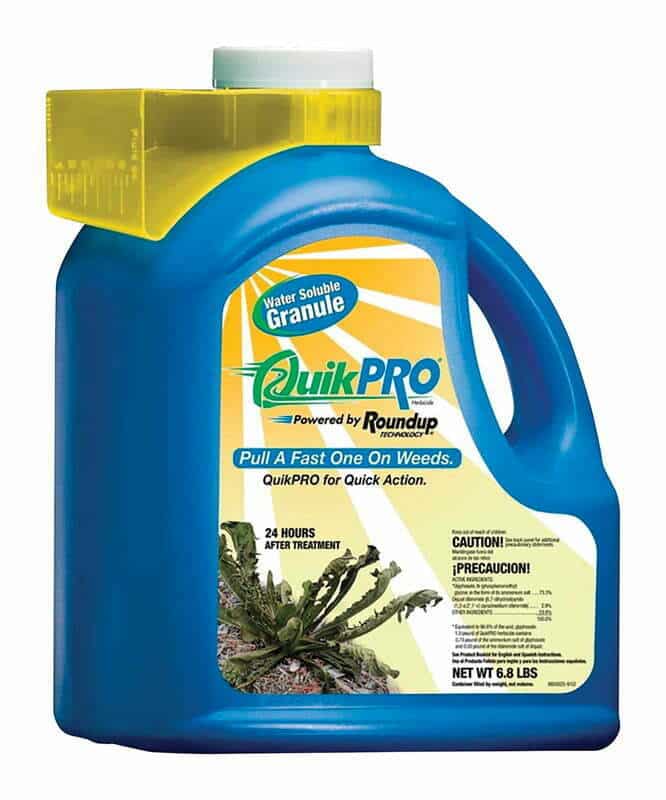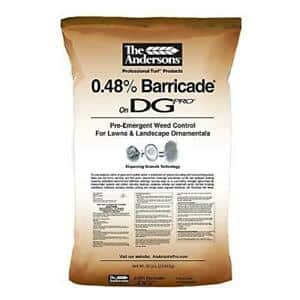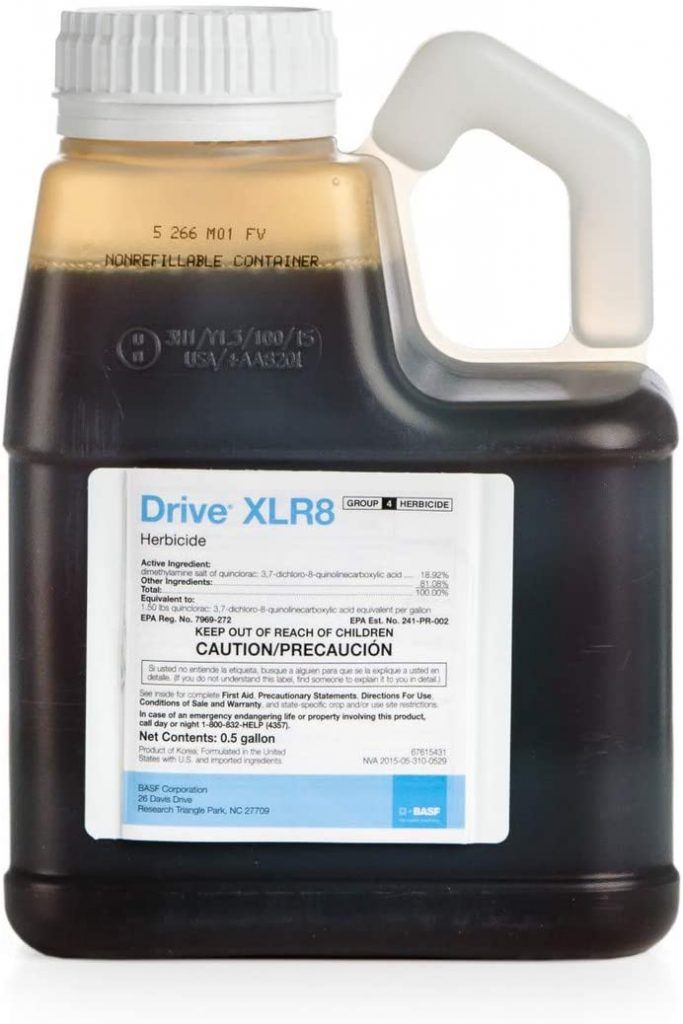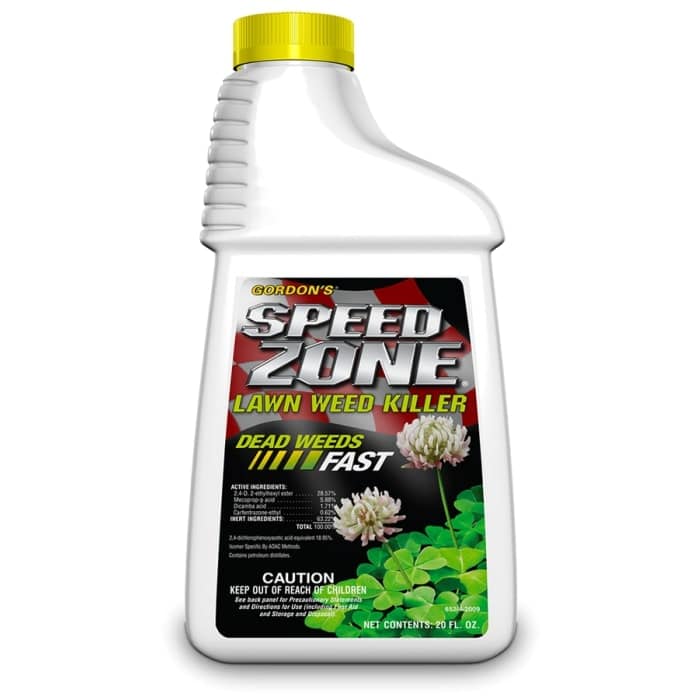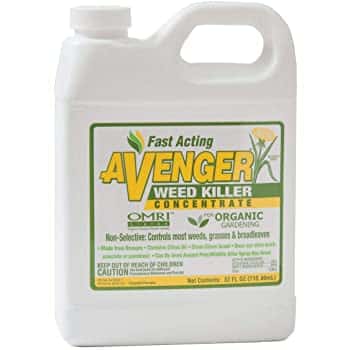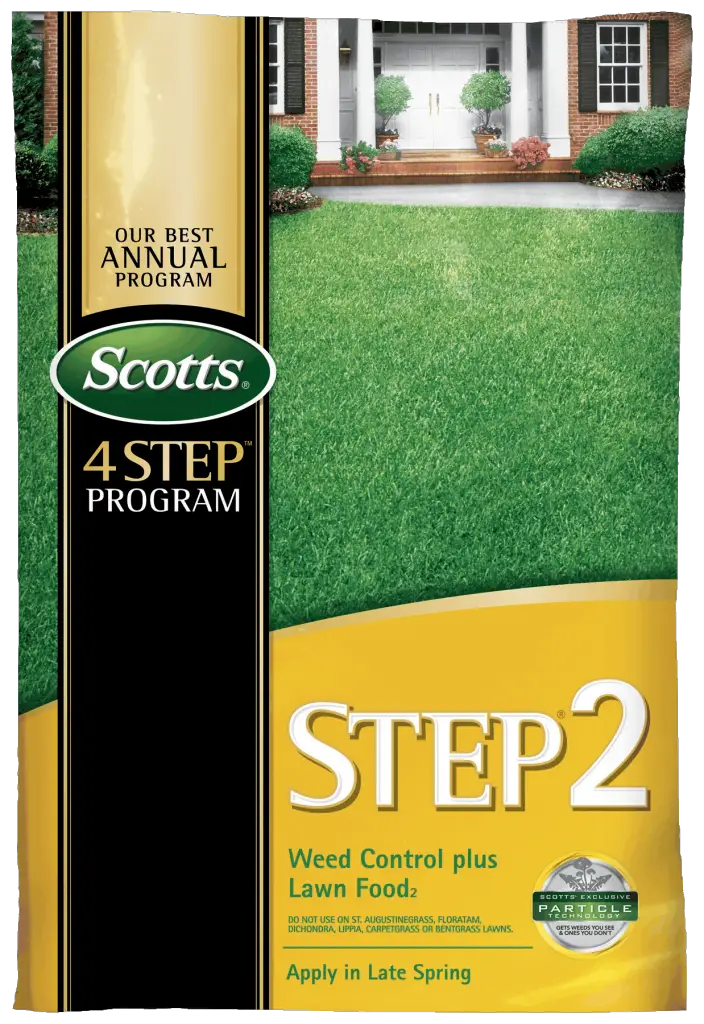Table of Contents
Weeds are something we all try to avoid when it comes to our lawns. While they are technically plants, they are almost always unwanted. They steal nutrients and resources from the plants you want in your yard. They grow quickly and have an abundant amount of seeds. It does not take long for your yard to become overrun with them. There are ways to contain pesky weeds.
I wanted to create an all-in-one page for the best weed killers for lawns in each category. These are all products you can find online, in big box stores, and even in professional stores like SiteOne or Valley Green. I’ve tested all of these products multiple times dating back to 2017-18, and I still use most of these today in my professional lawn care operation of 40+ commercial and residential lawns.
Product Review
Best Pre-Emergent
Barricade
Barricade contains the active ingredient Prodiamine and can be found in granular and liquid applications. Barricade is a pre-emergent herbicide and prevents weeds without harming beneficial and wanted plants. This is ideal when applied before weeds seeds can germinate and before weeds emerge. Barricade is one of the top pre-emergent weed killers and can be used on landscaping, ornamentals, turf, and sod farms, to name a few. It must be activated with water in 14 days or it could lose efficacy.
I use Prodiamine every April with great results and recommend it as part of my free lawn care guide. Many professional lawn care operators use Dimension for Rounds 1-2, but Prodiamine just works better. Yes, it’s yellow and it can look messy – but it just works so much better. I use this in the spring in Round 1, and again in the last summer if my customers do not oversees. This is a great fall pre-emergent option to help suppress winter weeds and poa annua.
Pros:
- Lasts as long as 9 months
- Affordable and comes in generic versions
- Great weed killer of all types
- Early season application is best
Cons:
- Must be watered right away
- Not the best for broadleaf weeds
- Breaks down with sunlight exposure
Compare Barricade 0.48% prices on Amazon and Do My Own.
Best Crabgrass Killer
Drive XLR8
No surprise here. I’ve written about Drive XLR8 several times here on Lawn Phix and it’s the only crabgrass killer I keep in my professional chemical rotation. The active ingredient is Quinclorac and is the best post-emergent weed killer. It is most effective for killing crabgrass, but also targets some broadleaf weeds and grassy weeds.
This is best when used on the specific weed you want to spray. Some grasses, such as St. Augustine grass can not handle quinclorac as a selective weed killer.
I have quinclorac on hand at all times for crabgrass. I’ll mix this with Empero and a non-ionic surfactant (Induce) to hit crabgrass and nutsedge – or with On Deck (2,4-d and dicamba) which makes an amazing 3-way herbicide that covers both grassy and broadleaf weeds in one.
Pros:
- Labeled for up to 100 different weeds
- Works almost immediately
- Does not need water to kill weeds
Cons:
- Restricted in some states
- Must be cautious where it is sprayed
Compare Drive XLR8 prices on Amazon and Do My Own.
Best Selective Weed Killer
Speedzone Lawn Weed Killer
Speedzone is one of my favorite weed killers for broadleaf weeds. It’s a toss-up between Speedzone and End Run with Trimec, but for DIYers looking to keep the initial up-front costs lower, Speedzone is a terrific choice. Plus it comes in a smaller 20 oz. bottle which makes it less cumbersome to pour and smaller to store versus 1-2.5 gallon jugs.
This post-emergent weed killer combines 4 active ingredients (2,4-D, 2-ethylhexyl ester, Dicamba, Mecoprop-P). Speedzone gets into the leaf tissue and roots to provide great results and fast visible burndown. In some states, it is restricted to only those with an application license. TZone and End Run / Trimec are excellent alternatives for those states.
We like Speedzone and Tenacity Herbicide to effectively kill all types of grassy and broadleaf weeds.
Pros:
- A 4-way herbicide with 4 active ingredients
- Labeled for 100 broadleaf and grassy weeds
- Purslane, dandelion, chickweed, henbit, creeping charlie, and more
- Ideal for cool-season turf
Cons:
- Restricted in some states
Compare Speedzone prices on Amazon and Do My Own.
Best Non-Selective Weed Killer
RoundUp QuikPRo
RoundUp QuickPro is a top weed killer for commercial and residential use. It has two active ingredients (Glyphosate and Diquat) to provide a more effective and efficient burndown. It will kill weeds such as woody brush, grass weeds, and broadleaf weeds. The rain will not wash it away due to its fast dry time. RoundUp QuickPro comes premixed with Diquat, so there is no need for tank mixing.
Pros:
- It contains a second ingredient
- It has a fast visual result
- Fast burndown and kills weeds to the root
- It is ideal when undergoing a full lawn renovation
Cons:
- It may take a longer time to see the results
- Will not work on horseweed
Compare Round Up Quick Pro prices on Amazon and Do My Own.
Best Organic Weed Killer
Avenger Organics Weed Killer
Avenger is the best organic weed killer for lawns because it is a nonselective herbicide making it safe for the environment. It is made from orange rind with D-limonene (citrus oil) as its active ingredient. Avenger Organics removes the plant cuticle to dehydrate it so it dies. This natural weed killer is fast-acting and does not stain. However, since it is a nonselective weed killer, it will damage or kill your good grass.
I love this stuff. The first time I used it was in 2017 when I was killing off poa annua. I also used this as part of my 2020 lawn renovation project. My front yard is a popular spot for my kids and the neighbors to hang out and play, so I felt better knowing I had a safer alternative to other non-selective chemicals. Avenger did the job, and my lawn came out great.
Pros:
- Safe for the environment
- Contains D-limonene and is organic OMRI listed
- Comes in concentrated and ready-to-use (RTU) form
Cons:
- May not see results right away
Compare Avenger weed killer prices on Amazon and Do My Own.
Best Fertilizer & Weed Preventer (Step 1)
Jonathan Green Green-Up
Jonathan Green Green-Up is the first step in a four-step lawn care program for a weed-free lawn. It is clear, odorless, and will not stain your hands or shoes. It contains fewer harmful ingredients than other options. It can be used all season long to prevent crabgrass effectively. It can feed lawns for as long as three months.
I’m a big fan of Jonathan Green products, and the Green-Up is the perfect pre-emergent + fertilizer combo for Round 1 in early spring. Remember that you will still need to apply a second split pre-emergent application for season-long control. You can also use this and Magical Plus or Love Your Soil together.
Pros:
- An excellent 4-step program
- Contains Dithiopyr (Dimension) crabgrass preventer
Cons:
- Only works up to the three-leaf stage of weed growth
Best Weed & Feed (Step 2)
Scotts Turf Builder Weed & Feed
Scotts Turf Builder Weed & Feed is the second step of a four-step lawn weed killer program. It attacks not only weeds you can see but also ones you do not. This product should be applied in late spring for ideal results. This weed killer is ideal for dandelions, clover, and broadleaf weeds. It feeds lawns to thicken them and crowd out weeds.
I am not a fan of weed and feed products. I’m not even a big proponent of Scott’s products, but Round 2 works great when applied according to the directions. This Step 2 and their Turf Builder for seeding are the only two products from this brand that I like and can honestly recommend. It effectively kills broadleaf weeds and is the best option for those sticking to a simple 4-step plan.
Pros:
- Excellent for killing dandelions
- Many satisfied customers
Cons:
- Cannot be used on certain types of grass
- Grass must be wet before applying
Things to Consider
Contact Weed Killers vs. Systemic Weed Killers
Contact Weed Killers can be applied to weed stems and leaves. They work when they have contact with the weed and can be effective quickly, potentially in a few hours. It does not usually get to the root. However, by destroying the leafy green part of the plant, the root cannot survive. These weed killers effectively kill annual weeds that have shallow roots.
Systemic Weed Killers soaks into leaves and travels through the plant system. These lawn weed killers stop photosynthesis to prevent nutrition absorption at the root. Systemic weed killers are best for deep-rooted perennial weeds. It may take many weeks and a second application to see results.
Selective vs. Non-Selective Weed Killers
Selective Weed Killers only kill the targeted plants while leaving the surrounding grass untouched. This weed control is ideal for gardens and lawn weeds.
Non-selective weed Killers will kill all plants in the area. This weed killer is perfect for areas without wanted plants, such as a sidewalk or driveway.
Pre Emergent vs. Post Emergent Herbicides
Pre-emergent weed killers stop weeds before they germinate and become problematic. Spring begins the weed seed germination life cycle and is the best time to apply. Pre-emergent herbicides must be mixed and applied carefully. They also require watering to activate critical ingredients.
Post Emergent weed killers are applied to the leaves after the plant emerges. These are best used before the plant is mature and just as it begins to grow.
FAQs
What is the Most Effective Weed Killer for Lawns?
The most effective weed killer for lawns is Southern Ag Amine 24-D Weed Killer. It can target broadleaf weeds without killing grass. This selective weed killer is a concentrated solution.
What Weed Killer Kills Most Weeds?
Ortho Weed B Gon Weed Killer kills up to 250 weeds when applied properly. This best weed killer comes in a concentrated formula that will not harm your grass. It is rainproof, ideal for southern or northern lawns, and has results in hours.
What Weed Killer Do Landscapers Use?
Landscapers commonly use glyphosate. It is available in many forms and is a general all purpose weed killer. There is some debate about how safe it is for humans, so be cautious when using.
When Should You Put Weed Killer on Lawn?
The best time to put weed killer on lawn is in the Spring when the plant is actively growing, closely followed by Fall. When you apply it in Spring, you catch the weeds before their pre-growth and stop them from sprouting. Spring is ideal to apply weed killer because it is warm and wet, typically conditions a weed killer needs. Fall is also a good time because weeds are vulnerable.

